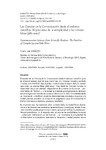Las Ciencias de la Comunicación desde el realismo científico: el problema de la complejidad y las noticias falsas (fake news)

Use este enlace para citar
http://hdl.handle.net/2183/37747
A non ser que se indique outra cousa, a licenza do ítem descríbese como Atribución-NoComercial-SinDerivadas 4.0 Internacional
Coleccións
- Investigación (FHUM) [116]
Metadatos
Mostrar o rexistro completo do ítemTítulo
Las Ciencias de la Comunicación desde el realismo científico: el problema de la complejidad y las noticias falsas (fake news)Título(s) alternativo(s)
Communication Sciences from Scientific Realism: The Problem of Complexity and Fake NewsAutor(es)
Data
2020Cita bibliográfica
Arrojo, M. J. (2020). Communication Sciences from Scientific Realism: The Problem of Complexity and Fake News. ArtefaCToS. Revista De Estudios Sobre La Ciencia Y La tecnología, 9(1), 131–158. https://doi.org/10.14201/art202091131158
Resumo
[Resumen] El estudio de las Ciencias de la Comunicación desde el realismo científico pone
de relieve el carácter dual de estas disciplinas. Son Ciencias Sociales y también Ciencias de lo Artificial. Esta dualidad incide al tratar la objetividad y la verdad, para evitar las noticias falsas (fake news). Vista desde las Ciencias Sociales, la objetividad lleva a una realidad independiente de la mente que la conoce —permite hablar de “hechos”— y la verdad se entiende principalmente en términos epistemológicos (contenidos en correspondencia con lo real). Considerada desde las Ciencias de lo Artificial, donde la objetividad está vinculada a la acción y la verdad práctica, prevalece un componente pragmático, pues ahora descansa en
diseños orientados a objetivos, procesos y resultados. En el primer caso, las cuestiones sobre la objetividad y la verdad llevan directamente a las dimensiones semántica, epistemológica y ontológica, donde el realismo científico puede proporcionar criterios para poder enfocar la práctica profesional periodística. En el segundo caso, al ampliar las posibilidades humanas —sobre todo mediante el uso de Internet—, se incrementa la complejidad de los fenómenos comunicativos. Este entorno de acción y verdad práctica resulta más difícil de establecer desde el realismo científico y requiere un componente
de pragmatismo. [Abstract] The study of the communication sciences from the perspective of scientific
realism highlights the dual nature of these disciplines. They are social sciences and also sciences of the artificial. This duality has an impact when dealing with objectivity and truth, in order to avoid false news. Seen from the social sciences, objectivity leads to a reality independent of the mind that knows it —it allows us to speak of “facts”— and truth is understood mainly in epistemological terms (contents in correspondence with what is real). Considered from the sciences of the artificial, where objectivity is linked to action and practical truth, a pragmatic component prevails, since it now rests on designs oriented to objectives, processes and results.In the first case, issues about objectivity and truth lead directly to the semantic, epistemological and ontological dimensions, where scientific realism can provide criteria to focus professional journalistic practice. In the second case, by
expanding human possibilities —especially through the use of the Internet—, the complexity of communicative phenomena increases. This environment of action and practical truth is more difficult to establish from scientific realism and requires a component of pragmatism.
Palabras chave
Social
Artificial
Objetividad
Verdad
Hechos
Objectivity
Truth
Facts
Artificial
Objetividad
Verdad
Hechos
Objectivity
Truth
Facts
Versión do editor
Dereitos
Atribución-NoComercial-SinDerivadas 4.0 Internacional
ISSN
1989-3612






